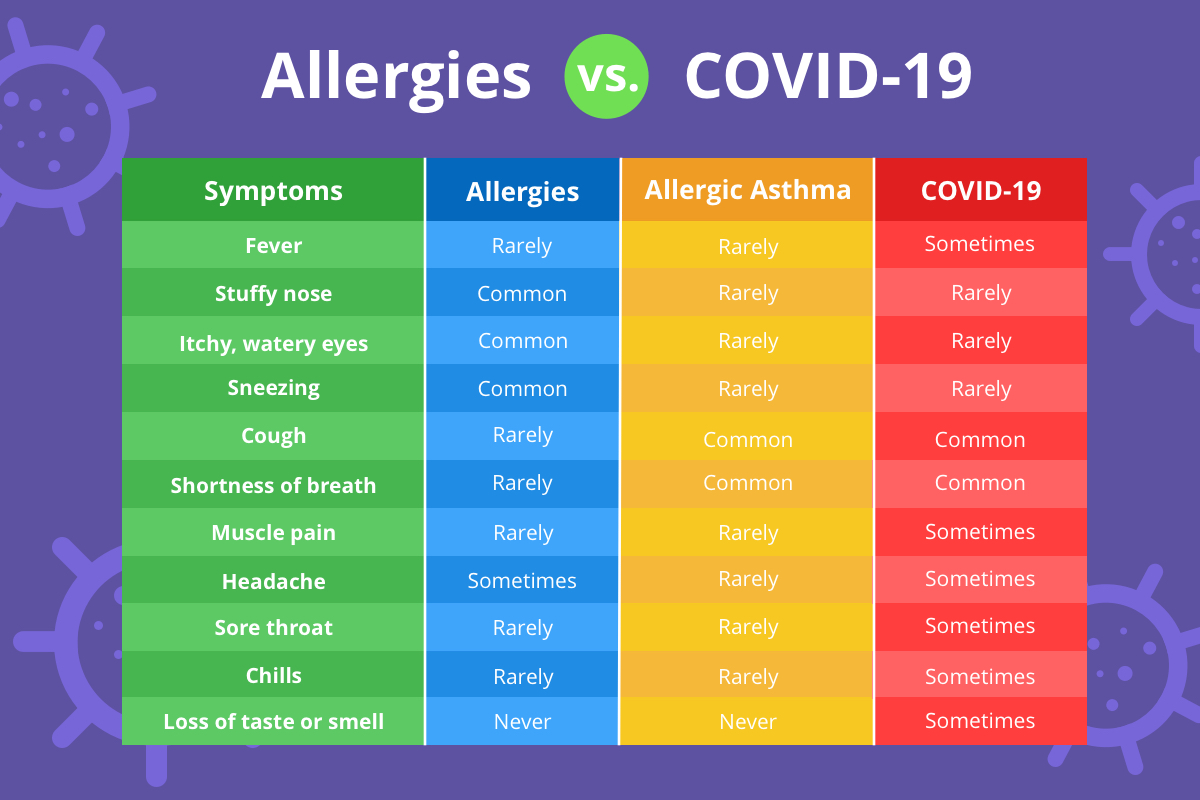Is It Allergies or COVID-19?
If you have seasonal allergies, you may think that sneezing and a stuffy nose are reliable signs of spring. In a typical year, you might wonder whether your symptoms are due to allergies or a cold but this spring, there’s the added concern of whether your symptoms could indicate COVID-19. How can you tell the difference, and what should you do, if you have symptoms and are unsure of what’s causing them?
Allergy symptoms
According to the American Academy of Allergy Asthma & Immunology (AAAAI), people with allergies typically experience:
- Stuffy nose
- Runny nose
- Sneezing
- Itchy, watery eyes
People with allergic asthma may experience:
- Coughing
- Wheezing
- Shortness of breath
Some people with allergies may also have headaches and fatigue.
COVID-19 symptoms
The Centers for Disease Control and Prevention (CDC) reports that symptoms of COVID-19 include:
- Fever
- Cough
- Shortness of breath/difficulty breathing
- Chills, shaking
- Muscle pain
- Headache
- Sore throat
- Loss of taste or smell
Allergies vs. COVID-19

If you suspect COVID-19
If you’re feeling sick and your symptoms are similar to those of COVID-19, or if you’ve been exposed to the coronavirus, have an online doctor visit to get medical advice from home. Doctors on Amwell can assess your risk, screen for COVID-19, and determine next steps for care.
If you’re feeling sick and have symptoms common to multiple conditions, you may want to speak with a doctor as well. COVID-19 is a new disease and our understanding of it is still evolving.
The CDC reports that most cases of COVID-19 are mild and can be managed with home care. You should also take precautions to avoid spreading the virus to others:
- Stay at home.
- Avoid contact with other people or pets. If you can’t avoid being in the same room, wear a mask or face covering and stay 6 feet away.
- Cover your coughs and sneezes.
- Wash your hands often.
- Don’t share household items.
- Clean frequently touched surfaces daily.
Keep an eye out for worsening symptoms. If you develop any of these serious warning signs, call 911:
- Trouble breathing
- Persistent chest pain or pressure
- Confusion or inability to arouse
- Bluish lips or face
- Any other severe or concerning symptom
If you suspect allergies
If your symptoms are more in line with allergies or allergic asthma, consider an online doctor visit. An Amwell doctor can help determine whether your symptoms are allergy-related, recommend treatment, and provide next steps for care.
If you’ve previously been diagnosed with allergies or allergic asthma, you may find relief with one or more of these approaches:
- Identify and avoid your allergy triggers. You can learn what substances set off your allergy or asthma symptoms with allergy testing. Once you know what your triggers are, you can limit exposure. For example, if your allergies are triggered by pollen, you can avoid outdoor activity or wear a mask or face covering when pollen counts are high.
- Consider medications. These may be over-the-counter or prescription and come in various forms, including pills and nasal sprays.
- Talk to a doctor about immunotherapy. You may be able to reduce your body’s sensitivity to specific allergy triggers with immunotherapy shots or tablets.
- Turn to technology. You can check out these 5 apps to help manage allergies or view this guide to beating spring allergies.